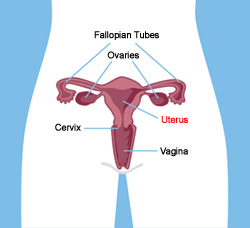
Gestational trophoblastic disease (GTD) is a rare group of tumors that involves abnormal cell growth in the uterus for women of childbearing age. Unlike other reproductive cancers, the tumors develop from cells that would normally grow into the placenta during a pregnancy.
GTDs include hydatidiform mole (or molar pregnancy), choriocarcinoma and placental site trophoblastic tumors. Most GTDs are non-cancerous, although some develop into cancer. All are highly treatable.
Risk factors
- Extremes of maternal age (very young or advanced age)
- Prior history of GTD
Signs and Symptoms
- Pelvic pain or pressure
- Anemia
- Hyperemesis gravidarum (excessive vomiting during early pregnancy)
- Hyperthyroidism
- Missed menstrual period with elevated human chorionic gonadotropin (HCG)
- HCG is often called the pregnancy hormone because it is the hormone detected by home pregnancy tests.
- Abnormal uterine bleeding
- Uterus less than or larger than expected for pregnancy dates
- Seen on ultrasound
Diagnosis
- Dilation and curettage, also known as a "D and C." (Dilation means to widen the opening of the cervix. Curettage involves removing a sample of the endometrium to be examined by a pathologist.)
- Tissue removed from the uterus is sent to the pathology lab for analysis.
- Referral to a gynecologic oncologist is indicated if additional treatment is needed.
Treatment
After the removal of the abnormal GTD tissue, some cases resolve spontaneously. After the removal of the abnormal tissue, serial measurements of HCG are monitored until it returns to a normal value. If the HCG level remains elevated, additional treatment is needed.
Treatment Options for GTD
- Surgery
- A suction dilation and curettage usually removes all abnormal tissue and preserves the patients’ fertility.
- A hysterectomy (removal of the uterus) may be performed if a woman has GTD and is absolutely sure she does not want any more children.
- Chemotherapy
- If a woman’s HCG levels fail to decrease after a procedure, additional treatment is recommended. GTD is extremely sensitive to anti-cancer drugs.
Virtual Visits Are Available
Safe and convenient virtual visits by video let you get the care you need via a mobile device, tablet or computer wherever you are. We’ll gather your medical records for you and get our experts’ input so we can offer treatment options without an in-person visit. To schedule a virtual visit, call 1-866-680-0505.

